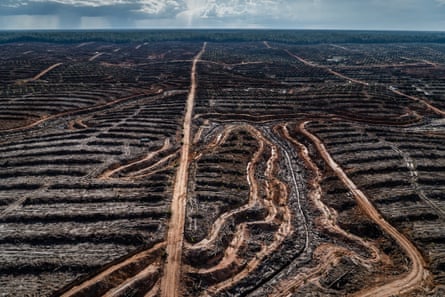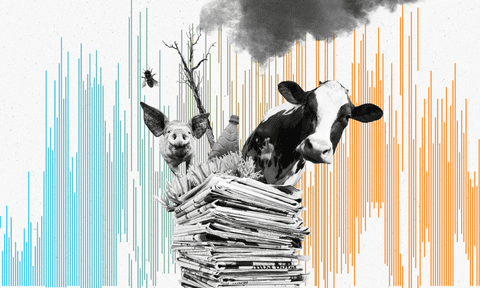Since the Guardian pledged a year ago to give the climate crisis even greater priority, we have published a piece of environmental journalism on average every three hours. Greenhouse gas emissions, heatwaves, wildfires, melting polar ice, floods, droughts, the annihilation of wildlife, air pollution … the problems grow more severe every year.
Of course, 2020 has been dominated by the coronavirus pandemic, but even here the correlation with environmental destruction is clear.

The Covid link
The “tip of the iceberg” – that was the warning early in the year, when we reported that many more viruses were present in wildlife and just waiting to be released by the human destruction of nature. The UN’s environment chief said “nature is sending us a message” that our abuse of the planet had consequences.
As critical as it is to tackle the damage caused by Covid-19, the root cause – the invasion of wild places and the exploitation of wild animals – is not being addressed, experts warned in the Guardian, despite the relatively tiny amount it would cost. Without action, even worse pandemics would happen, top scientists warned.
The cascade of pandemic impacts is also hitting food supplies in vulnerable places, with the Guardian highlighting fears of the worst food crisis in 50 years and a “famine of biblical proportions”. We also revealed how meat processing plants had become hotspots of Covid-19 infections among workers: “Everyone’s on top of you, sneezing and coughing,” one person told us.
While a temporary reduction in air pollution was a rare benefit of the pandemic, long-term exposure to dirty air appears to drive up Covid infections and deaths. The Guardian revealed the latest research, including a striking study providing compelling evidence of a link, as well as the discovery of the virus on pollution particle samples. Poor quality air might also help explain the disproportionate impact of Covid on minority ethnic communities, we revealed.
The coronavirus crisis is also an opportunity, however, with trillions of dollars being deployed to fund the recovery. In-depth series in both the UK and Australia set out how this is a once-in-a-lifetime opportunity to put the world on track to tackle the climate crisis, transforming energy, transport, food and even aviation.

The fossil-fuel lobby
Of course, fossil fuel vested interests remain, and the Guardian exposed their lobbying for cash in the US, Australia and around the world. We also took a road trip around the UK to seek the views of ordinary people on the Covid recovery. The conclusion: few want a return to “normal”.
That normal would mean the relentless rise of global heating, with the brief cut in emissions during lockdown no more than a blip. Nowhere is that heating more obvious than in the oceans. In January, the Guardian’s print edition led its front page with the news of a record high ocean temperature in 2019, showing the “irrefutable and accelerating” heating of the planet.
The danger signs kept coming, and we kept reporting them, from the temperature in the Antarctic rising above 20C for the first time on record, to deforestation in the Amazon hitting its highest level in a decade.
One of the principal duties of the Guardian is to hold power to account. Our landmark series, The Polluters, revealed the 20 fossil fuel companies whose exploitation of oil, gas and coal reserves had caused more than one-third of all carbon emissions in the modern era, as well as Google’s funding of climate change deniers and the power of the car lobby.
In the US, the 100 days countdown series to the US withdrawal from the 2015 Paris agreement showed how the global climate fight could be lost if Donald Trump is re-elected and how worsening heatwaves are exacerbating systemic racial inequalities.

Wildfires and wildlife
In Australia, the Guardian ran an agenda-setting interactive series, The Frontline, laying bare the climate emergency in the country. The starkest illustration were the devastating bushfires that raged through the summer months and were documented in The Summer of Dread and After the Bushfires projects. Amid all this, we revealed the third mass bleaching event on the Great Barrier reef in five years.
In fighting the climate crisis, the power of protest has become a mighty force in the last two years. We have championed the protesters, being at the UN in New York for Greta Thunberg’s emotional condemnation of world leaders, and exploring in depth the rise of Extinction Rebellion and how it can reinvent itself for a post-pandemic world. We also revealed that a quarter of all tweets about the climate crisis came from bots that amplified denialist messages.
Like the climate emergency, the annihilation of wildlife that threatens the air, water and food on which we depend has not gone away, and neither has the Guardian’s coverage of the crisis. In our Age of Extinction series we examined the deadly truth behind almond milk – “it’s like sending bees to war” – and, like all Guardian exclusives, this was followed up widely by other media.
We also revealed the $1m-a-minute farming subsidies that are ravaging the natural world and the mysterious mass die-off of hundreds of elephants in Botswana, and dug into the UK’s high-speed rail project’s impact on biodiversity and climate change.

Dirty air
The largest environmental cause of human disease and death in the world today is pollution, responsible for many millions of premature deaths. We have kept a sharp focus on this, revealing, for example, research linking air pollution to brain cancer for the first time.
Pollution takes many forms and we have reported in depth on the “cancer town” in the US where the risk of the disease is 50 times above the national average, and revealed that microplastic pollution is raining down on city dwellers, with as yet unknown effects on lung health.
Rivers have long suffered from pollution but we revealed the startling fact that water companies discharged raw sewage into English rivers more than 200,000 times in 2019. The only thing worse than dirty water is no water, and we exposed the scandal of millions of US citizens being unable to afford water bills.
While hard-hitting news is at the Guardian’s core, some stories need space to tell, such as our journey to Antarctica where we encountered the surprising sound of icebergs melting, and our long read on the career of the world’s most revered naturalist, Sir David Attenborough. Another extraordinary tale was that of Takaya, the lone sea wolf whose spirit captured worldwide attention.
A touch of hope
We also know that finding solutions is vital in tackling the environmental challenges facing the world, which is why we reported from Darfur on how a water project was helping to end the “first climate change war” and how scientists created a mutant bacterial enzyme that broke down plastic bottles for recycling in hours.
In the UK, the good news included the benefits of beavers, which now have a permanent home in Devon as well as Scotland, and plans to rewild a large patch of East Anglia and to bring back wild bison for the first time in 6,000 years.
The Guardian’s commitment to environmental reporting has real world impacts, but these are rarely easy to measure. So it is useful to hear from those at the top.
Christiana Figueres, the UN’s climate chief when the Paris deal was sealed in 2015, said: “Without the work of the Guardian the delivery of the Paris agreement would have been far harder or perhaps even impossible. Its role has continued to be essential in the years since as the situation has become more urgent on a host of issues including climate change and biodiversity. At a time when the darkness of fake news and doubt in science is everywhere, the Guardian is a point of light.”
Bill McKibben, the leading climate writer and campaigner, said: “There is nothing in the English-language press that comes close to matching the scope and the commitment of the Guardian’s coverage of climate change. At this point, the climate change fight resembles nothing so much as a war. War reporting is the place where newspapers have traditionally shined, bringing all their resources to bear. The Guardian is the only newspaper who has figured out what our time on Earth is really about.”
